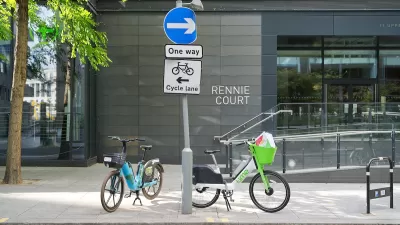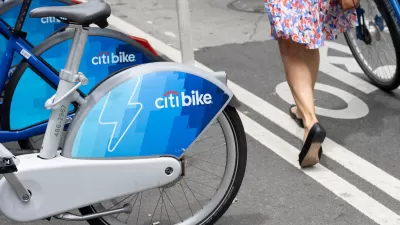Bike share is in some ways the opposite of public transit, from a demographic perspective. While transit is often disproportionately patronized by low income riders, bike share is overwhelmingly avoided by that same group. NPR looks for the reasons.
NPR reporter Joel Rose examines why bike share is not catching on with those on the bottom end of the economic ladder. "They're supposed to make commuting easier, greener and cheaper. But the people who arguably need these bikes the most are often the least likely to access them," he writes for this story, part of NPR's project on commuting in America. [Listen here].
"The rates of low-income ridership of all bike-share programs around the world is pitifully low. So we can only do better," says Caroline Samponaro, of Transportation Alternatives in New York. The Citi Bike system launched in New York earlier this year.
To illustrate, Rose meets Samponaro "at a docking station near a big public housing project in Brooklyn. It's right across the street from a busy bike lane, and about two blocks from the foot of the Manhattan Bridge — in other words, a prime spot for bike commuting. But the docking station just sits there, full of bikes, waiting for riders. Samponaro says this unfortunately fits with the data so far."
"The demographic information I've seen to date is that it's more men than women, and only 0.5 percent are low-income New Yorkers," says Samponaro, who considers that a pretty poor rating.
Rose adds that "every bike-sharing system that's launched so far has had trouble attracting large numbers of low-income and minority riders."
One problem is the cost. "(T)ypical bike-sharing membership costs somewhere between $60 and $100 a year. Many of these systems offer discounts for low-income riders, but they're not always well-known or advertised." And then there's the issue of needing a credit card.
However, as has been pointed out here, bike share systems need to become financially sustainable, unlike public transit systems that have more public funding sources. London and Toronto are struggling to make ends meet.
While Rose focuses on income levels, he also points out that most of "users so far tend to be young and male."
FULL STORY: Shifting Gears To Make Bike-Sharing More Accessible

Planetizen Federal Action Tracker
A weekly monitor of how Trump’s orders and actions are impacting planners and planning in America.

San Francisco's School District Spent $105M To Build Affordable Housing for Teachers — And That's Just the Beginning
SFUSD joins a growing list of school districts using their land holdings to address housing affordability challenges faced by their own employees.

The Tiny, Adorable $7,000 Car Turning Japan Onto EVs
The single seat Mibot charges from a regular plug as quickly as an iPad, and is about half the price of an average EV.

Seattle's Plan for Adopting Driverless Cars
Equity, safety, accessibility and affordability are front of mind as the city prepares for robotaxis and other autonomous vehicles.

As Trump Phases Out FEMA, Is It Time to Flee the Floodplains?
With less federal funding available for disaster relief efforts, the need to relocate at-risk communities is more urgent than ever.

With Protected Lanes, 460% More People Commute by Bike
For those needing more ammo, more data proving what we already knew is here.
Urban Design for Planners 1: Software Tools
This six-course series explores essential urban design concepts using open source software and equips planners with the tools they need to participate fully in the urban design process.
Planning for Universal Design
Learn the tools for implementing Universal Design in planning regulations.
Smith Gee Studio
City of Charlotte
City of Camden Redevelopment Agency
City of Astoria
Transportation Research & Education Center (TREC) at Portland State University
US High Speed Rail Association
City of Camden Redevelopment Agency
Municipality of Princeton (NJ)





























